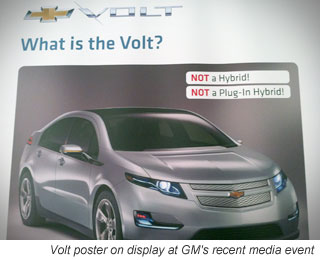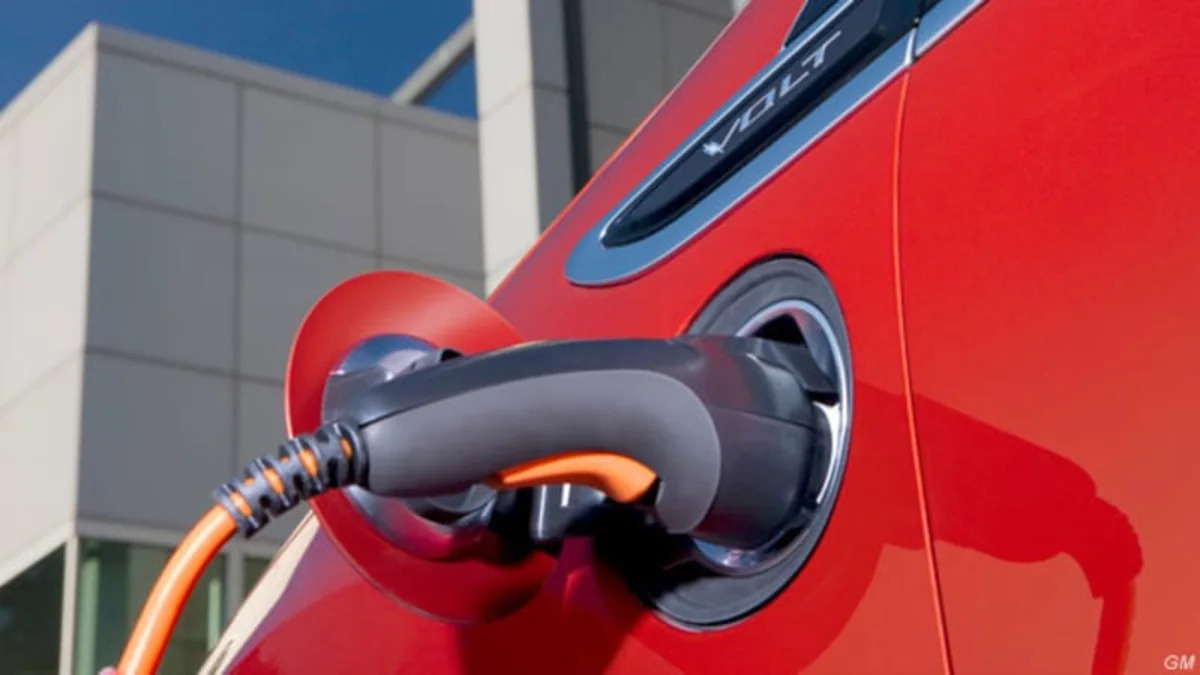All the controversy surrounding the Chevy Volt's unique drivetrain raises a bigger issue: Why would GM mislead the media for months about how it really works? Why does the company refuse to call the Volt a plug-in hybrid, the most obvious and accurate description of the car? Why, even now, having explained that the gas engine does indeed couple to the transaxle gearing that drives the wheels of the car, do Chevy PR people insist on making statements in their press materials like these?
GM gave us at least two reasons for this snafu, and has posted a less-than-forthcoming clarification on its Volt blog. The first thing GM said was that it was concerned with protecting the secrecy of its transmission during the patent application process. Larry Nitz, GM's executive director of hybrid and electric powertrain engineering, told Translogic that until the patent was approved, GM did not want to reveal the details of how the Volt's drive system actually worked. While that may be true, it doesn't excuse GM spokespeople deliberately misleading the media (and therefore the public) about the way the Volt drivetrain works.
 It also doesn't get to the heart of the matter, which is that GM desperately wants the Volt to be considered something other than a hybrid. Rob Peterson, the lead Chevy Volt communications spokesman, admitted to AOL Autos that the company does not want the Volt to get compared with the forthcoming plug-in version of the Toyota Prius. GM is concerned that a public unfamiliar with electric vehicles and generally unknowledgeable about how they work will be unable to grasp the dramatic differences between the two vehicles.
It also doesn't get to the heart of the matter, which is that GM desperately wants the Volt to be considered something other than a hybrid. Rob Peterson, the lead Chevy Volt communications spokesman, admitted to AOL Autos that the company does not want the Volt to get compared with the forthcoming plug-in version of the Toyota Prius. GM is concerned that a public unfamiliar with electric vehicles and generally unknowledgeable about how they work will be unable to grasp the dramatic differences between the two vehicles.
Those differences look to be substantial. Although Toyota has not yet released the production plug-in Prius scheduled for 2012, it has been showing its prototype (which we got a chance to drive in Translogic Episode 7.2). With a much shorter EV range of about 13 miles, and without the ability to lock into EV mode or drive in EV mode above 60 miles per hour, the Prius plug-in is a far less robust electric vehicle than the Volt. By comparison, the Volt can travel in EV mode for 25-50 miles, and can drive at its top speed of 100 mph under electric power alone.
- "The Chevrolet Volt is not a hybrid."
- "...it is the industry's only purely electrically driven vehicle with overall efficiency and range approaching traditional engine- or hybrid-driven models of its size."
- "Unlike a conventional powertrain, there are no step gears within the unit, and no direct mechanical linkage from the engine to the wheels."
GM gave us at least two reasons for this snafu, and has posted a less-than-forthcoming clarification on its Volt blog. The first thing GM said was that it was concerned with protecting the secrecy of its transmission during the patent application process. Larry Nitz, GM's executive director of hybrid and electric powertrain engineering, told Translogic that until the patent was approved, GM did not want to reveal the details of how the Volt's drive system actually worked. While that may be true, it doesn't excuse GM spokespeople deliberately misleading the media (and therefore the public) about the way the Volt drivetrain works.
 It also doesn't get to the heart of the matter, which is that GM desperately wants the Volt to be considered something other than a hybrid. Rob Peterson, the lead Chevy Volt communications spokesman, admitted to AOL Autos that the company does not want the Volt to get compared with the forthcoming plug-in version of the Toyota Prius. GM is concerned that a public unfamiliar with electric vehicles and generally unknowledgeable about how they work will be unable to grasp the dramatic differences between the two vehicles.
It also doesn't get to the heart of the matter, which is that GM desperately wants the Volt to be considered something other than a hybrid. Rob Peterson, the lead Chevy Volt communications spokesman, admitted to AOL Autos that the company does not want the Volt to get compared with the forthcoming plug-in version of the Toyota Prius. GM is concerned that a public unfamiliar with electric vehicles and generally unknowledgeable about how they work will be unable to grasp the dramatic differences between the two vehicles.
Those differences look to be substantial. Although Toyota has not yet released the production plug-in Prius scheduled for 2012, it has been showing its prototype (which we got a chance to drive in Translogic Episode 7.2). With a much shorter EV range of about 13 miles, and without the ability to lock into EV mode or drive in EV mode above 60 miles per hour, the Prius plug-in is a far less robust electric vehicle than the Volt. By comparison, the Volt can travel in EV mode for 25-50 miles, and can drive at its top speed of 100 mph under electric power alone.
Clearly GM is afraid that customers, buoyed the strong Prius brand, might decide that 13 miles of EV mode is enough. With the plug-in Prius expected to cost under $30,000, the Toyota competition could look like a bargain compared to the $40,280 Volt, even if you subtract the $7,500 Federal tax credit. Looking at the Prius' 50 mpg combined EPA rating, against the Volt's expected fuel economy in the upper 30's when its gasoline engine is running in extended range mode, isn't going to help that value proposition.
An even more important motivator for GM's steadfast refusal to allow the Volt to be regarded as a hybrid is that EV's have become the popular new frontier in alternative transportation. Hybrids may have been the green technology of the 2000's, but GM is perceptive enough to realize that by now they're decidedly last decade. If the Volt is able to convince consumers GM has the leading EV on the market, it could effectively become the Prius of electric cars. GM might wince at the connection, but it could do much worse.
Watch Bradley take the 2011 Chevy Volt for a spin at GM's secret proving grounds.
The video meant to be presented here is no longer available. Sorry for the inconvenience.


Sign in to post
Please sign in to leave a comment.
Continue